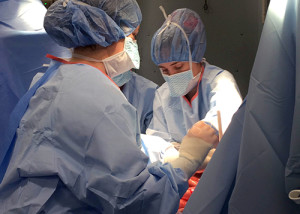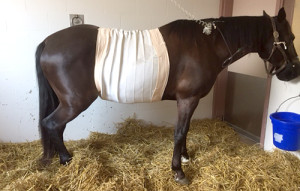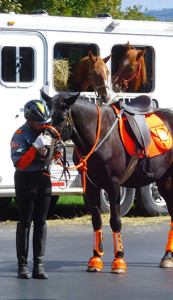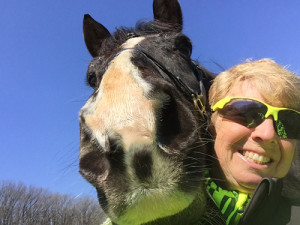Incredible Colic Surgery Recovery Following Removal of Grapefruit-Sized Strangulating Lipoma
Partner, Poster Horse For Colic Surgery
Penn Vet Extra by: Louisa Shepard
Veterinarian Dr. Amy Worrell just happened to be at Three Bays Farm where she boards her horses, along with barn owners Janet and Neil Citron. Medications provided no relief for Partner’s relentless pain. Worrell called Partner’s owner, Eleanor Mueller.
“Amy told me: ‘He is in serious pain. If you won’t let me take him to New Bolton Center, I’m putting him down,’” Mueller said, remembering the late afternoon conversation. “I said, ‘You are not going to put him down.’”
The team loaded Partner onto the trailer in Reading and raced to the hospital, arriving in 45 minutes. “We made it to New Bolton, and everybody was waiting for us,” Janet Citron said. “Everybody there is caring; that was where he needed to be.”
Dr. Maia Aitken, a board-certified surgeon and Emergency and Critical Carespecialist, took the case. Given Partner’s pain, and the results of a comprehensive colic examination, Aitken suspected a life-threatening and painful condition that causes acute colic: a strangulating lipoma, a mass of fatty tissue that wraps itself around the intestine and cuts off the blood supply.
Emergency Surgery
Partner, 20 years old, needed emergency colic surgery to remove the lipoma and repair the intestine, or he would not survive. Aitken called his owner and explained.
“My concern before the surgery was that he would come out of it with a life compromised, with a lot of future colics, or other problems,” Mueller said.
“I asked her: ‘Will he have his life back again?’ And Maia said, ‘I really believe he will.’ I asked her: ‘Do you think he can survive surgery?’ Maia said, ‘Yes.’ So I said, ‘Get to work,’” Mueller recalled.
“If he could have a normal life, then I would not deny him that chance,” she said. “Once I had Maia’s word on that, I was fine. I knew she would do what she had to do to save him.”
The surgery took nearly three hours starting the night of July 30, and ending with Partner standing and awake at 3 a.m. on July 31. Aitken removed a lipoma the size of a grapefruit, along with 18 feet of intestine that was necrotic, due to the lack of blood supply.
“Sometimes when we remove the lipoma, the blood supply returns,” she said, “but in this case, the section of the intestine was already compromised.”
Not a problem. Horses have up to 70 feet of intestine and can spare up to a third. In older horses, lipomas are a common cause of colic that require surgery, she said.
“An older horse can do really well after colic surgery, even with a big resection,” Aitken said. “Just because an older horse is colicking, they aren’t doomed. They can still have an excellent quality of life post-surgery.”
In some cases, and older horse can take longer than average to recover, Aitken said, but Partner was the exception.
A Model Recovery
Partner spent several days fewer than expected recovering in the colic wing of New Bolton Center’s Moran Critical Care Center, having had no complications following surgery. “He was fantastic,” Aitken said. “He was the poster horse for colic surgery.”
Partner ate well, with no reflux, and his incision was healing beautifully. On August 3, he was ready to go home. Citron, who had stayed until 3 a.m. the night of the surgery, and came back the following days to walk him, was surprised he was ready. So was Mueller.
“His progress from the minute he got out of surgery to the time he was fully recovered was just one step short of miraculous,” Mueller said. “I don’t think anybody could have predicted a recovery like this.”
For six weeks, Partner was supposed to be on stall rest and hand walked, with a gradual return to exercise in about 12 weeks, but Citron asked Aitken if she could please ride him sooner because he was so rambunctious. Just eight weeks after surgery, she was riding him at a slow walk around a half-mile track.
“I thought it was mentally better for him,” Citron said. “Dr. Aitken agreed, but made me promise to not go galloping through the countryside.”
A Full Life, Post-Surgery
Mueller bought Partner (registered name Emerald Blaze) when he was four years old, and stabled him near her home in Long Island. Four years ago, when her husband was ill, she sent him to Three Bays Farm in Reading.
Partner was insulin intolerant, overweight, and unpredictable in his behavior. He was also “food crazed,” according to Mueller. Citron put him on a diet, and put him to work, and he became a much happier horse.
Citron did notice his canter was “discombobulated,” but thought it was because she was not accustomed to riding a gaited horse. Now she knows it was because of the lipoma, which takes years to grow.
“Now he has the most awesome canter,” Citron said. “I could have a glass of wine in my hand and not spill a drop.”
Mueller said the transformation explains some of Partner’s behavior over the past few years. “I don’t think any of us knew what kind of pain he was in,” she said.
Partner and Citron are members of Middlecreek Search and Rescue, having gone through extensive training on how to work a grid, primarily to find people who are lost.
In October, Partner went to a meet-and-greet at Country Meadow assisted living in Reading. “He was great,” Citron said. “He stood there and let everybody pet him.”
The pair also competes in orienteering, like treasure hunting on horseback. The first time they competed, they came in third; the second time, they came in second; and from then on, they have been first. “He is very competitive. And Janet is, too. She brings out the very best in him,” Mueller said.
Easter weekend in March they tried their first hunter pace since his surgery, at Fair Hill, 7.1 miles in 1 hour and 22 minutes. They won. “It was such a great ride,” she said. “We were 12 seconds off ideal pace time in the daredevil division, but we didn’t push. He loves paces.”
Mueller, the Citrons, and Aitken are proud of Partner, pleased that he is doing so well. Citron emphasized that his success was a team effort.
“Partner is the perfect example of giving older horses a chance,” Aitken said. “It’s like 20 years old is the new 10, certainly for this horse.














